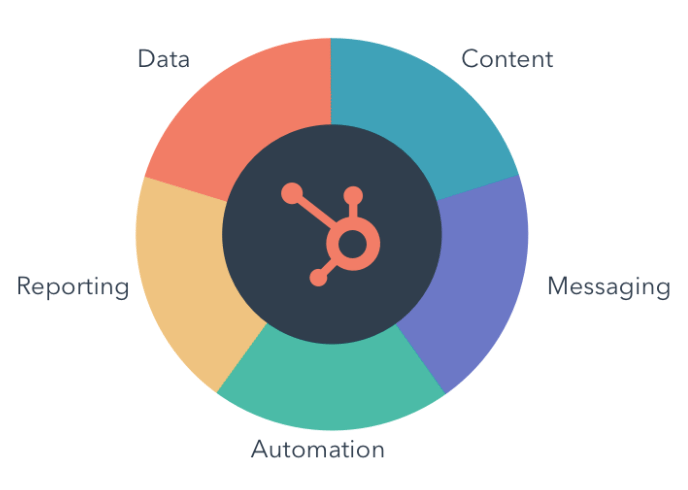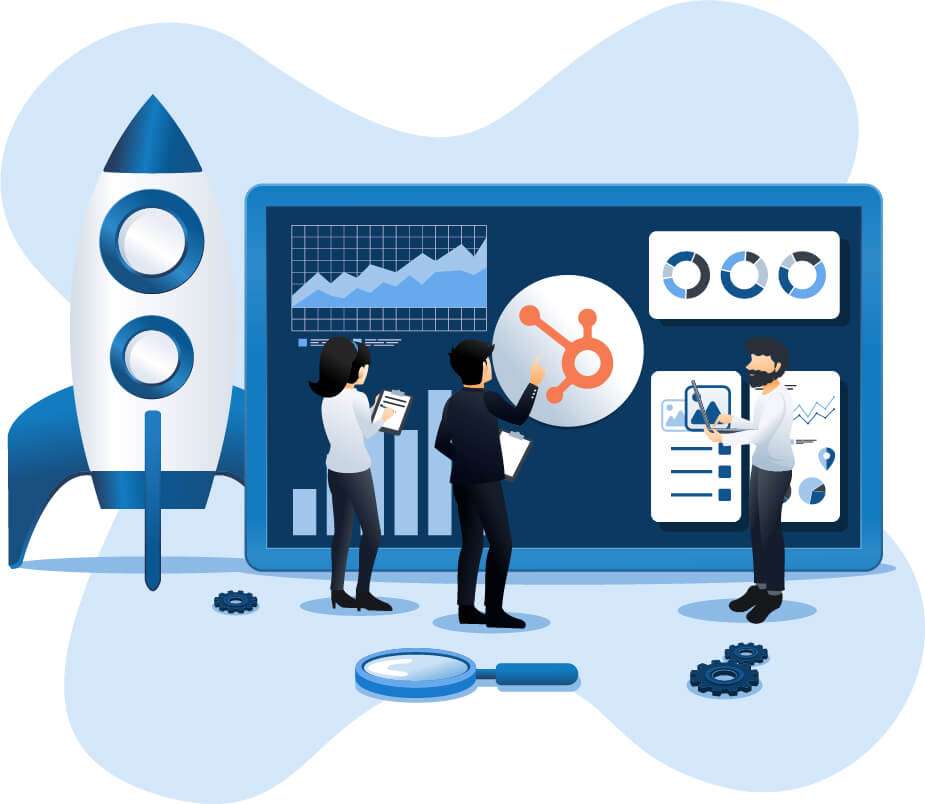State ottenendo il massimo valore dalla vostra sottoscrizione a HubSpot? Il programma HubSpot Admin Accelerator è per ottimizzare il vostro investimento.
Come iniziare - Guida a un'implementazione efficace di HubSpot
La prospettiva di un'implementazione di HubSpot vi tiene svegli la notte?
Nell'attuale panorama aziendale competitivo, l'utilizzo di una solida piattaforma CRM come HubSpot è fondamentale per il successo nel marketing, nelle vendite e nel servizio clienti. Esploreremo le caratteristiche principali che portano al successo in tutti gli hub per aiutarvi a ottenere il massimo dalla vostra implementazione di HubSpot. Ora iniziamo!


Capire HubSpot
HubSpot è un'innovativa piattaforma all-in-one di inbound marketing, vendite e assistenza clienti, progettata per fornire alle aziende gli strumenti necessari per crescere e avere successo nell'era digitale. L'obiettivo principale di HubSpot è quello di semplificare e snellire le operazioni integrando vari moduli che lavorano insieme in modo coerente, migliorando la produttività e l'efficienza complessiva.
HubSpot è più di un semplice software: è una filosofia che ruota attorno all'inbound marketing. Consente alle aziende di attrarre, coinvolgere e deliziare i clienti attraverso contenuti di valore, esperienze personalizzate e interazioni senza soluzione di continuità. L'approccio inbound di HubSpot dà la priorità alla fornitura di valore a potenziali clienti e clienti, favorendo relazioni a lungo termine e la fidelizzazione dei clienti. Alla base di questo approccio ci sono cinque caratteristiche fondamentali di HubSpot:

-
Dati: Il database unificato di HubSpot costituisce la base della piattaforma, centralizzando i dati dei clienti per tutti i moduli. Elimina i silos di dati, fornendo una visione completa dei clienti e dei prospect per informare le decisioni strategiche.
-
Contenuti: Grazie a potenti strumenti di creazione e ottimizzazione dei contenuti, le aziende possono creare contenuti interessanti e pertinenti. Il miglioramento della SEO e della pertinenza del sito consente di aumentare il traffico e le conversioni di lead, favorisce il coinvolgimento e stabilisce una leadership di pensiero.
-
Messaggistica: Le funzioni di messaggistica di HubSpot facilitano le interazioni con i clienti su più canali. La messaggistica personalizzata e tempestiva rafforza le relazioni e favorisce la fiducia.
-
Reporting: La robusta reportistica e gli analytics di HubSpot forniscono informazioni utili sulle attività di marketing, vendita e assistenza clienti. Le aziende possono misurare le prestazioni, identificare le opportunità e ottimizzare le strategie per ottenere il massimo impatto.
-
Automazione: Sfruttando l'automazione, HubSpot ottimizza le attività ripetitive, risparmiando tempo e risorse. I flussi di lavoro dell'automazione alimentano i lead, gestiscono le comunicazioni e snelliscono i processi per aumentare l'efficienza.
Sfruttando queste caratteristiche fondamentali, le aziende possono spingere la loro implementazione di HubSpot verso nuovi traguardi. Ora, analizziamo i diversi moduli di HubSpot. Esploreremo come ogni modulo contribuisce a raggiungere gli obiettivi aziendali e a rivoluzionare l'esperienza dei clienti.
Gli hub principali di HubSpot
1. CRM (Gestione delle relazioni con i clienti)
L'Hub CRM è il cuore di HubSpot e offre una piattaforma completa per gestire le interazioni e le relazioni con i clienti. Permette alle aziende di organizzare e tenere traccia di tutti i contatti, gli accordi e le interazioni in un unico database centralizzato. Grazie a un'interfaccia facile da usare, le aziende possono gestire in modo efficiente le loro pipeline di vendita, monitorare l'andamento delle trattative e ottenere preziose informazioni sul comportamento dei clienti.
Inoltre, CRM Hub consente una perfetta integrazione con altri moduli di HubSpot, facilitando una visione olistica del percorso di ciascun cliente. Le aziende possono coltivare i lead, automatizzare i follow-up e personalizzare le interazioni per costruire relazioni durature. Sfruttando efficacemente il CRM, i team di vendita possono ottimizzare i processi, identificare le opportunità di crescita e chiudere le trattative in modo più efficiente.
2. Hub di marketing
Il Marketing Hub è un centro di potere per gli sforzi di inbound marketing, che fornisce una suite di strumenti per attrarre, coinvolgere e convertire i potenziali clienti in clienti. Dalla creazione e ottimizzazione di contenuti accattivanti all'esecuzione di campagne e-mail mirate, il Marketing Hub fornisce alle aziende le risorse per aumentare la loro visibilità online e generare lead di alta qualità.
Le aziende possono sfruttare l'automazione del marketing per coltivare i contatti in base al loro comportamento, garantendo interazioni personalizzate e tempestive. Le funzioni di analisi e reporting di Marketing Hub offrono preziose informazioni sulle prestazioni delle campagne, consentendo agli addetti al marketing di perfezionare le strategie per ottenere risultati migliori.
3. Hub vendite
Il Sales Hub offre ai team di vendita strumenti per gestire e accelerare i processi di vendita. Dal monitoraggio delle comunicazioni con lead e prospect all'automazione delle attività ripetitive, il Sales Hub ottimizza i flussi di lavoro per una maggiore produttività. I rappresentanti di vendita possono ricevere notifiche in tempo reale quando i lead interagiscono con i contenuti, consentendo loro di rispondere prontamente e di adattare il loro approccio.
Inoltre, il Sales Hub offre una serie di strumenti per un coinvolgimento efficace dei lead, come sequenze di e-mail personalizzate e programmazione di riunioni. Grazie all'accesso a potenti analisi, i professionisti delle vendite possono identificare le aree di miglioramento, prevedere le entrate e dare priorità ai lead in modo strategico.
4. Hub dei servizi
Il Services Hub è dedicato a fornire un servizio e un'assistenza clienti eccellenti. Consente alle aziende di organizzare e gestire in modo efficiente le richieste dei clienti, i ticket di assistenza e i feedback. La funzione di knowledge base consente ai clienti di trovare autonomamente le risposte alle loro domande, riducendo le richieste di assistenza.
Le aziende possono creare esperienze di onboarding personalizzate, raccogliere i feedback dei clienti e monitorare la loro soddisfazione con gli strumenti di sondaggio e feedback di Services Hub. Questo modulo aiuta a costruire relazioni fedeli con i clienti, a promuovere la brand advocacy e a fidelizzare i clienti.
5. Hub dei contenuti (sistema di gestione dei contenuti)
Il Content Hub di HubSpot è un sistema che cambia le carte in tavola per le aziende che desiderano ottimizzare la propria presenza online e offrire un'esperienza di navigazione eccezionale. Come potente sistema di gestione dei contenuti, offre strumenti solidi per la creazione, la gestione e l'ottimizzazione dei contenuti del sito web senza bisogno di competenze tecniche.
Grazie a un intuitivo editor drag-and-drop, le aziende possono facilmente progettare pagine web di grande impatto, esteticamente gradevoli e facili da usare. Content Hub pone inoltre l'accento sull'ottimizzazione SEO, consentendo alle aziende di migliorare il posizionamento sui motori di ricerca e di attirare più traffico organico. Le funzioni di personalizzazione consentono di adattare i contenuti in base al comportamento dei singoli visitatori, migliorando il coinvolgimento degli utenti.
6. Hub operativo
Le Data Hub è una soluzione dinamica che migliora la sincronizzazione dei dati, l'automazione e la reportistica tra i vari moduli di HubSpot. Questo hub colma il divario tra le operazioni di marketing, vendita e assistenza, facilitando la collaborazione e l'integrità dei dati.
Uno dei vantaggi principali del Data Hub è l'automazione della qualità dei dati, che garantisce che il CRM rimanga aggiornato e preciso. Ciò si traduce in una migliore segmentazione, in un marketing mirato e in esperienze personalizzate per i clienti. Data Hub offre inoltre dashboard di reporting avanzati, che consentono alle aziende di accedere a informazioni in tempo reale e di prendere decisioni basate sui dati.
L'implementazione dei moduli chiave di HubSpot nell'onboarding consente alle aziende di snellire le operazioni, migliorare l'esperienza dei clienti e ottenere una crescita notevole nell'attuale panorama competitivo.
Selezione degli hub e dei livelli giusti per la vostra azienda
La scelta degli hub e dei livelli di HubSpot più adatti alla vostra azienda è una decisione cruciale che può avere un impatto significativo sul vostro successo con la piattaforma. Con una serie di funzionalità e opzioni di prezzo disponibili, è essenziale allineare le esigenze e gli obiettivi aziendali con la giusta combinazione di hub e livelli. In questa sezione analizzeremo i fattori chiave da considerare per prendere questa decisione, assicurandovi di massimizzare i benefici della vostra implementazione di HubSpot.
1. Comprendere le esigenze aziendali
Il primo passo per selezionare gli hub e i livelli giusti per la vostra azienda è comprendere a fondo le vostre esigenze e i vostri obiettivi specifici. Eseguite una valutazione approfondita dei vostri processi di marketing, vendita e assistenza clienti per identificare i punti dolenti, le opportunità di miglioramento e le aree che richiedono l'automazione. Considerate le dimensioni della vostra azienda, la portata delle vostre operazioni e il vostro pubblico di riferimento.
Coinvolgete gli stakeholder dell'organizzazione per raccogliere le opinioni e i punti di vista dei vari dipartimenti. Valutare lo stack tecnologico esistente e determinare se le integrazioni con HubSpot sono essenziali per un flusso di dati continuo. Comprendendo i requisiti specifici della vostra azienda, potrete allinearvi meglio con i moduli e le funzionalità HubSpot più adatti.
2. Confronto tra i livelli di HubSpot
Oltre al livello Free, HubSpot offre tre livelli principali: Starter, Professional ed Enterprise. Ogni livello offre una serie di caratteristiche, capacità e limitazioni diverse. È essenziale confrontare le offerte di ciascun livello e valutare come si allineano alle esigenze aziendali e al budget a disposizione.
-
Starter: questo livello è ideale per le piccole imprese o per chi è alle prime armi con l'ecosistema HubSpot. Offre funzioni essenziali di CRM, marketing, vendite e assistenza clienti. Sebbene il livello Starter fornisca una solida base, può avere limitazioni sul numero di contatti o sulla complessità dell'automazione.
-
Professionale: Il livello Professional si rivolge alle aziende in crescita con esigenze più ampie. Offre funzioni avanzate, maggiore capacità e funzionalità di automazione più sofisticate. Le aziende che desiderano scalare le proprie attività e sfruttare funzionalità di marketing e vendita più approfondite possono trovare il livello Professional adatto.
-
Enterprise: Il livello Enterprise è progettato per le grandi organizzazioni con esigenze complesse. Offre le funzionalità più avanzate, le opzioni di personalizzazione e le integrazioni più robuste. Le aziende che cercano una soluzione altamente personalizzata e un'assistenza su misura dovrebbero prendere in considerazione il livello Enterprise.
3. Considerazioni sul budget
Il budget gioca un ruolo importante nella scelta degli hub e dei livelli giusti per la vostra azienda. I costi associati a ciascun livello possono variare in modo significativo, pertanto è essenziale valutare i vincoli di budget e il ritorno sull'investimento che ci si aspetta di ottenere.
Il livello Starter può essere conveniente per le piccole imprese, ma può offrire solo alcune delle funzionalità necessarie per la crescita. Al contrario, il livello Enterprise può essere più costoso, ma fornisce l'accesso a strumenti avanzati per alimentare un'espansione aziendale sostanziale.
4. Scalabilità e potenziale di crescita
Con la crescita dell'azienda, le esigenze di HubSpot possono evolvere. Considerate la scalabilità degli hub e dei livelli scelti per soddisfare le vostre esigenze future. La scelta giusta dovrebbe consentire l'espansione e l'adattamento senza problemi all'evoluzione dell'azienda.
5. Possibilità di integrazione
Valutate come HubSpot possa integrarsi con lo stack tecnologico esistente e con le applicazioni di terze parti. La sincronizzazione dei dati e le integrazioni sono fondamentali per massimizzare la produttività e snellire i processi nei vari reparti.
Potrebbe piacerti anche...
Supporto per l'implementazione e l'onboarding di HubSpot
Quando si intraprende il viaggio verso l'implementazione di HubSpot, avere un supporto completo per l'onboarding è fondamentale per garantire una transizione di successo e senza interruzioni. HubSpot fornisce solide risorse e strumenti di onboarding per aiutare le aziende a massimizzare il loro investimento nella piattaforma.
Accademia HubSpot
Una delle principali risorse di apprendimento offerte da HubSpot è HubSpot Academy, una preziosa piattaforma di apprendimento che offre un'ampia gamma di corsi, certificazioni ed esercitazioni. HubSpot Academy fornisce agli utenti una conoscenza approfondita delle funzionalità della piattaforma, consentendo loro di navigare con sicurezza nei vari hub. Dalla formazione di base su CRM e marketing automation ai corsi avanzati di sales enablement e reporting, HubSpot Academy offre contenuti su misura per gli utenti di ogni livello di competenza.
Partner HubSpot
Aspiration Marketing può elevare il supporto all'onboarding a un livello superiore come partner HubSpot Platinum Solutions. In qualità di partner accreditato per l'onboarding con formatori certificati da HubSpot, forniamo una guida personalizzata e un'assistenza pratica durante tutto il processo di implementazione. Il nostro team di esperti comprende le esigenze specifiche delle aziende e adatta l'approccio all'onboarding di HubSpot di conseguenza, assicurando una transizione fluida e un utilizzo ottimizzato del vostro investimento in HubSpot.
Dalla creazione di un piano di implementazione personalizzato all'assistenza continua e alla risoluzione dei problemi, l'esperienza di Aspiration Marketing fornisce un'infrastruttura di supporto affidabile per massimizzare il potenziale della piattaforma HubSpot. La nostra esperienza in HubSpot e la comprensione completa dei requisiti aziendali rendono il nostro team una scelta eccellente per le aziende che cercano un'esperienza di onboarding senza soluzione di continuità.
Sia che si tratti di adottare nuovi hub o di padroneggiare quelli esistenti, la combinazione del supporto di HubSpot per l'onboarding e dell'assistenza dedicata di Aspiration Marketing garantisce un processo di implementazione efficace e di successo.
Questo contenuto è disponibile anche in:
- Erste Schritte - Leitfaden für eine effektive HubSpot-Implementierung
- Getting Started - Guide To an Effective HubSpot Implementation
- Cómo empezar - Guía para una implementación de HubSpot efectiva
- Démarrage - Guide pour une mise en œuvre efficace de HubSpot
- Noțiuni introductive - Ghid pentru o implementare eficientă a HubSpot
- 入门--HubSpot 有效实施指南










Lascia un commento